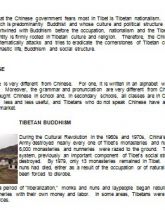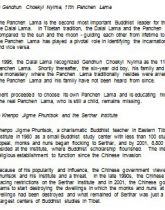Referát: Tibet is an occupied country
Skryť detaily | Obľúbený- Kvalita:76,5 %
- Typ:Referát
- Univerzita:Vysoká škola medzinárodného podnikania ISM Slovakia v Prešove
- Kategória:Prírodné vedy
- Podkategória:Geografia
- Predmet:Geografia
- Ročník:1. ročník
- Rozsah A4:3 strán
- Zobrazené:3 421 x
- Stiahnuté:1 x
- Veľkosť:0,1 MB
- Formát a prípona:MS Office Word (.doc)
- Jazyk:anglický
- ID projektu:2772
- Posledna úprava:10.03.2017
CULTURAL AND RELIGIOUS REPRESSION
What the Chinese government fears most in Tibet is Tibetan nationalism. In Tibet, a country which is predominantly Buddhist and whose culture and political structure were deeply intertwined with Buddhism before the occupation, nationalism and the Tibetan people's sense of identity is firmly rooted in Tibetan culture and religion. Therefore, the Chinese government systematically attacks and tries to eradicate the cornerstones of Tibetan culture - language, monastic life, Buddhism and social structure.
TIBETAN LANGUAGE
The Tibetan language is very different from Chinese. For one, it is written in an alphabet whereas Chinese is written in pictograms. Moreover, the grammar and pronunciation are very different from Chinese. In Tibet today, students are taught Chinese in school and, in secondary schools, all classes are in Chinese. Tibetan language is becoming less and less useful, and Tibetans who do not speak Chinese have a very difficult time competing in the job market.
What the Chinese government fears most in Tibet is Tibetan nationalism. In Tibet, a country which is predominantly Buddhist and whose culture and political structure were deeply intertwined with Buddhism before the occupation, nationalism and the Tibetan people's sense of identity is firmly rooted in Tibetan culture and religion. Therefore, the Chinese government systematically attacks and tries to eradicate the cornerstones of Tibetan culture - language, monastic life, Buddhism and social structure.
TIBETAN LANGUAGE
The Tibetan language is very different from Chinese. For one, it is written in an alphabet whereas Chinese is written in pictograms. Moreover, the grammar and pronunciation are very different from Chinese. In Tibet today, students are taught Chinese in school and, in secondary schools, all classes are in Chinese. Tibetan language is becoming less and less useful, and Tibetans who do not speak Chinese have a very difficult time competing in the job market.


